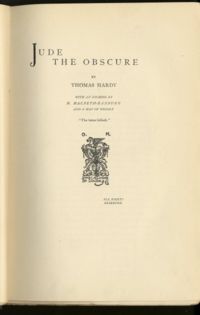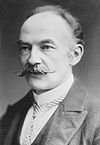- Jude the Obscure
-
Jude the Obscure 
Original title page of Jude the ObscureAuthor(s) Thomas Hardy Original title The Simpletons
Hearts InsurgentCountry United Kingdom Language English Genre(s) Tragedy Publication date 1895 Media type Print (Hardback & Paperback) ISBN n/a Preceded by Tess of the d'Urbervilles Followed by The Well-Beloved Jude the Obscure, the last of Thomas Hardy's novels, began as a magazine serial and was first published in book form in 1895. The book was burned publicly by William Walsham How, Bishop of Wakefield, in that same year.[1] Its hero, Jude Fawley, is a working-class young man who dreams of becoming a scholar. The other main character is his cousin, Sue Bridehead, who is also his central love interest. The themes in the novel revolve around issues of class, education, religion, and marriage. Hardy began making notes for the story in 1887.
Contents
Themes
The novel develops multiple intertwined themes. Most controversially, during England's Victorian era, Hardy criticized revered institutions like marriage and Christianity. He also criticizes the bourgeois values associated with marriage through the tragedy of his star-crossed lovers, Jude and Sue, whose attempts to defy social conventions for the sake of love leads to their misery.
Another major thematic focus of the novel is the issue of fixed class boundaries, particularly with regard to access to higher education for students from the working class. Although Jude wishes to attend the university, he can't afford to get his degree and is thereby shut out from having any economic mobility out of the working class. This theme of class was personal for Hardy since he, like Jude, was not able to attend university for financial reasons.
Another parallel between the book's characters/themes and Hardy's actual life experience occurs when Sue becomes obsessed with religion after previously having been indifferent and even hostile towards it. Through this extreme change in the character of Sue, Hardy shows Christianity as an extraordinarily powerful social force that is capable of causing a seemingly independent-minded woman like Sue to be self-immolating and sexually repressed.
Like Sue Bridehead, Hardy's first wife, Emma, went from being free-spirited and fairly indifferent to religion in her youth to becoming obsessively religious as she got older. Since Hardy was always highly critical of organized religion, as Emma became more and more religious, their differing views led to a great deal of tension in their marriage, and this tension was a big factor that led to their increased alienation from one another.
Emma was also very disapproving of Jude the Obscure, in part because of the book's criticisms of religion, but also because she worried that the reading public would believe that the relationship between Jude and Sue directly paralleled her strained relationship with Hardy (which, in a figurative sense, it did).[2]
Plot summary
The novel tells the story of Jude Fawley, a village stonemason in the southern English region of Wessex who yearns to be a scholar at "Christminster", a city modeled on Oxford. In his spare time while working in his aunt's bakery, he teaches himself Greek and Latin. Before he can try to enter the university, the naïve Jude is manipulated, through a process he later calls erotolepsy, into marrying a rather coarse and superficial local girl, Arabella Donn, who deserts him within two years. By this time, he has abandoned the classics altogether.
After Arabella leaves him, Jude moves to Christminster and supports himself as a mason while studying alone, hoping to be able to enter the university later. There, he meets and falls in love with his free-spirited cousin, Sue Bridehead. Jude shortly introduces Sue to his former schoolteacher, Mr. Phillotson, whom she later marries. Sue is satisfied by the normality of her married life, but quickly finds the relationship an unhappy one; in addition to being in love with Jude, not her husband, she is physically disgusted by her spouse, and, apparently, by sex in general.
Sue eventually leaves Phillotson for Jude. Sue and Jude spend some time living together without any sexual relationship; they are both afraid to get married because their family has a history of tragic unions, and think that being legally bound to one another might destroy their love. Jude eventually convinces Sue to sleep with him and, over the years, they have two children together. They are also bestowed with a child "of an intelligent age" from Jude's first marriage to Arabella, whom Jude did not know about earlier. He is named Jude and nicknamed "Little Father Time" because of his intense seriousness and moroseness.
Jude and Sue are socially ostracized for living together unmarried, especially after the children are born. Jude's employers always dismiss him when they find out, and landlords evict them. Their socially-disturbed boy, "Little Father Time," comes to believe that he and his half-siblings are the source of the family's woes. He murders Sue's two children and commits suicide by hanging. He leaves behind a note that simply reads, "Done because we are too menny."[3][4] Shortly thereafter, Sue has a miscarriage.
Beside herself with grief and blaming herself for "Little Father Time"'s actions, which were, in part, instigated by a conversation the two had had the previous night, Sue turns to the church that has ostracized her and comes to believe that the children's deaths were divine retribution for her relationship with Jude. Although horrified at the thought of resuming her marriage with Phillotson, she becomes convinced that, for religious reasons, she should never have left him. Arabella discovers Sue's feelings and informs Phillotson, who soon proposes they remarry. This results in Sue leaving Jude for Phillotson. Jude is devastated and remarries Arabella after she plies him with alcohol to once again trick him into marriage.
After one final, desperate visit to Sue in freezing weather, Jude becomes seriously ill and dies within the year. It is revealed that Sue has grown "staid and worn" with Phillotson. Arabella fails to mourn Jude's passing, instead setting the stage to ensnare her next suitor.
Reviews
Called "Jude the Obscene" by at least one reviewer,[5] Jude the Obscure received a harsh reception from scandalised critics; it is thought largely for this reason that Hardy made the decision to produce only poetry and drama for his remaining 32 years.
Jude was first published under the title The Simpletons; and then Hearts Insurgent in the European and American editions of Harper's New Monthly Magazine from December 1894 until November 1895. The initial, serialised edition was substantially different from the later novelized form. Many minor changes were made because the magazine publishers insisted — for moral reasons. Large portions of the plot were also different.
D. H. Lawrence, an admirer of Hardy, was puzzled by the character of Sue Bridehead, and attempted to analyse her sexual problem in his essay "A Study of Thomas Hardy" (1914).
At least one recent scholar has postulated that Jude borrowed heavily from an earlier novel The Wages of Sin by Lucas Malet.[6]
Film, TV, theatrical adaptations, cultural references
The novel has been adapted into two major feature films:
- Jude the Obscure (1971),[7] directed by Hugh David, and starring Robert Powell and Fiona Walker
- Jude (1996),[8] directed by Michael Winterbottom, and starring Christopher Eccleston and Kate Winslet
Additionally, "Jude the Obscure" was a long time pseudonymous contributor to the Northern Irish literary magazine The Honest Ulsterman.[9]
References
- ^ Slack, Robert C. Nineteenth-Century Fiction, Vol. 11, No. 4 (Mar., 1957), pp. 261-275
- ^ Tomalin, Claire. "Thomas Hardy." New York: Penguin, 2007.
- ^ Jude the Obscure, Chapter 2
- ^ Jude the Obscure, p. 738
- ^ Book description of Jude the Obscure, edited by Cedric Watts (1999)
- ^ Schaffer, Talia. The Forgotten Female Aesthetes: Literary Culture in Late-Victorian England. University of Virginia Press, 2000.
- ^ Jude The Obscure (1971) at imdb.com
- ^ Jude (1996) at imdb.com
- ^ The Honest Ulsterman
External links
Works by Thomas Hardy Novels The Poor Man and the Lady (1867) · Desperate Remedies (1871) · Under the Greenwood Tree (1872) · A Pair of Blue Eyes (1873) · Far from the Madding Crowd (1874) · The Hand of Ethelberta (1876) · The Return of the Native (1878) · The Trumpet-Major (1880) · A Laodicean (1881) · Two on a Tower (1882) · The Mayor of Casterbridge (1886) · The Woodlanders (1887) · Tess of the d'Urbervilles (1891) · Jude the Obscure (1895) · The Well-Beloved (1897)

Short story collections Wessex Tales (1888) · A Group of Noble Dames (1891) · Life's Little Ironies (1894) · A Changed Man and Other Tales (1913)
Poetry collections Wessex Poems and Other Verses (1898) · Poems of the Past and Present (1901) · Time's Laughingstocks (1909) · Satires of Circumstance (1914) · Moments of Vision (1917) · Late Lyrics and Earlier with Many Other Verses (1922) · Human Shows, Far Phantasies, Songs and Trifles (1925) · Winter Words in Various Moods and Metres (1928)
Individual poems "The Photograph" (1890) · "The Convergence of the Twain" (1915) "The Darkling Thrush" (1901)
Plays The Dynasts (1904–1908)Categories:- British novels
- 1895 novels
- Novels by Thomas Hardy
- Novels first published in serial form
- Works originally published in Harper's Magazine
- Victorian novels
- British novels adapted into films
Wikimedia Foundation. 2010.
